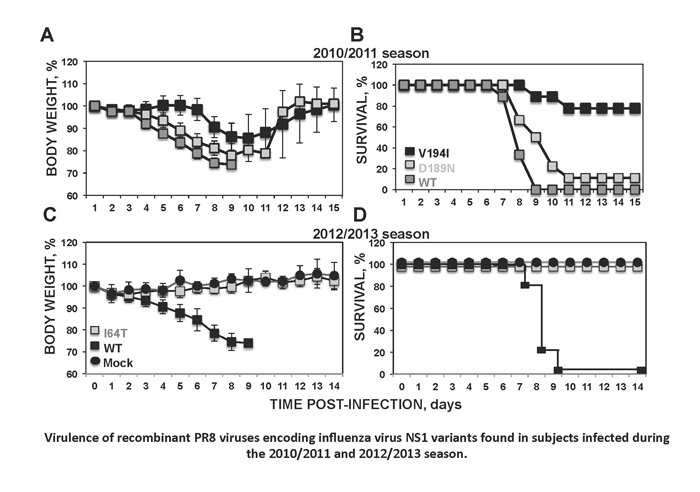Effect of influenza NS1 variability on innate immune responses and virus pathogenesis
 Viral infections, including influenza, induce the activation of host innate immune responses that aim to control replication of infecting viruses. Thus, to efficiently replicate within the host, influenza A viruses encode the non-structural 1 (NS1) protein, which is the main protein counteracting the host innate antiviral responses, through different mechanisms. We collect, sequence, and isolate seasonal influenza viruses infecting subjects in the Rochester, NY area, and look for amino acid changes in the NS1 protein. Our recent data from human subjects infected during the last seasons indicate that variability at the amino acid level within the NS1 protein is observed in seasonal circulating viruses. Importantly, we have described that many of these newly identified amino acid changes impact the ability of NS1 protein to counteract the host innate immune responses, and therefore, modulate the pathogenesis of the virus. Our goals are to identify new sequence features in the NS1 protein of currently circulating influenza A viruses that could be useful for risk assessment of seasonal and pandemic viruses; to identify novel mutations on influenza A NS1 protein and their contribution to known NS1 functions for the evasion of host immune responses; and, to demonstrate the importance of novel mutations in different functions of NS1 from circulating influenza A virus strains and their contribution to inflammation and viral pathogenicity.
Viral infections, including influenza, induce the activation of host innate immune responses that aim to control replication of infecting viruses. Thus, to efficiently replicate within the host, influenza A viruses encode the non-structural 1 (NS1) protein, which is the main protein counteracting the host innate antiviral responses, through different mechanisms. We collect, sequence, and isolate seasonal influenza viruses infecting subjects in the Rochester, NY area, and look for amino acid changes in the NS1 protein. Our recent data from human subjects infected during the last seasons indicate that variability at the amino acid level within the NS1 protein is observed in seasonal circulating viruses. Importantly, we have described that many of these newly identified amino acid changes impact the ability of NS1 protein to counteract the host innate immune responses, and therefore, modulate the pathogenesis of the virus. Our goals are to identify new sequence features in the NS1 protein of currently circulating influenza A viruses that could be useful for risk assessment of seasonal and pandemic viruses; to identify novel mutations on influenza A NS1 protein and their contribution to known NS1 functions for the evasion of host immune responses; and, to demonstrate the importance of novel mutations in different functions of NS1 from circulating influenza A virus strains and their contribution to inflammation and viral pathogenicity.